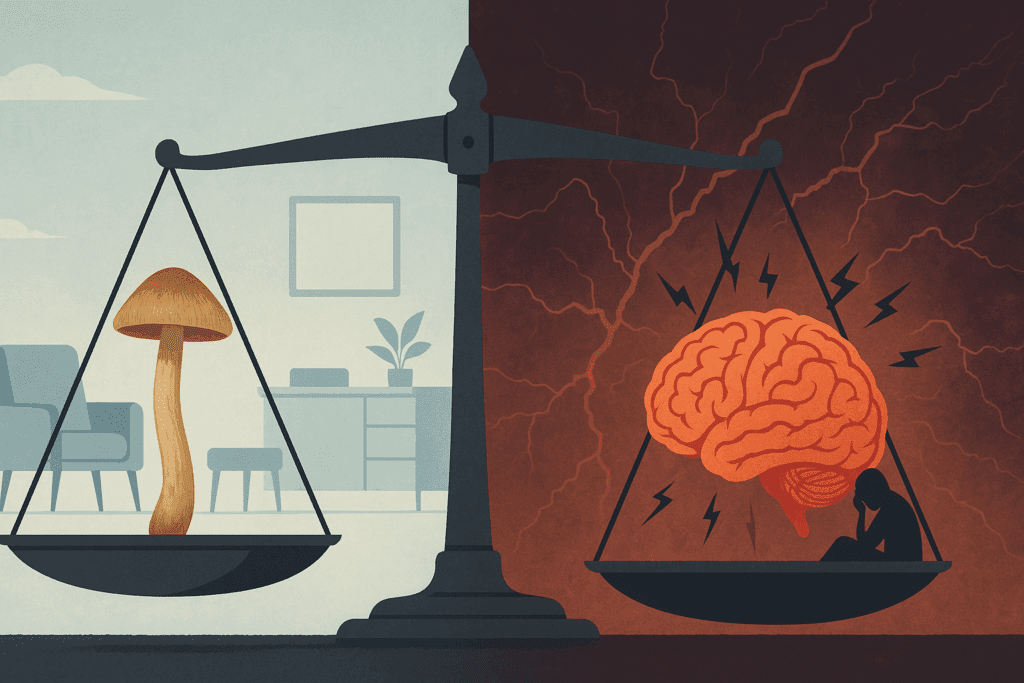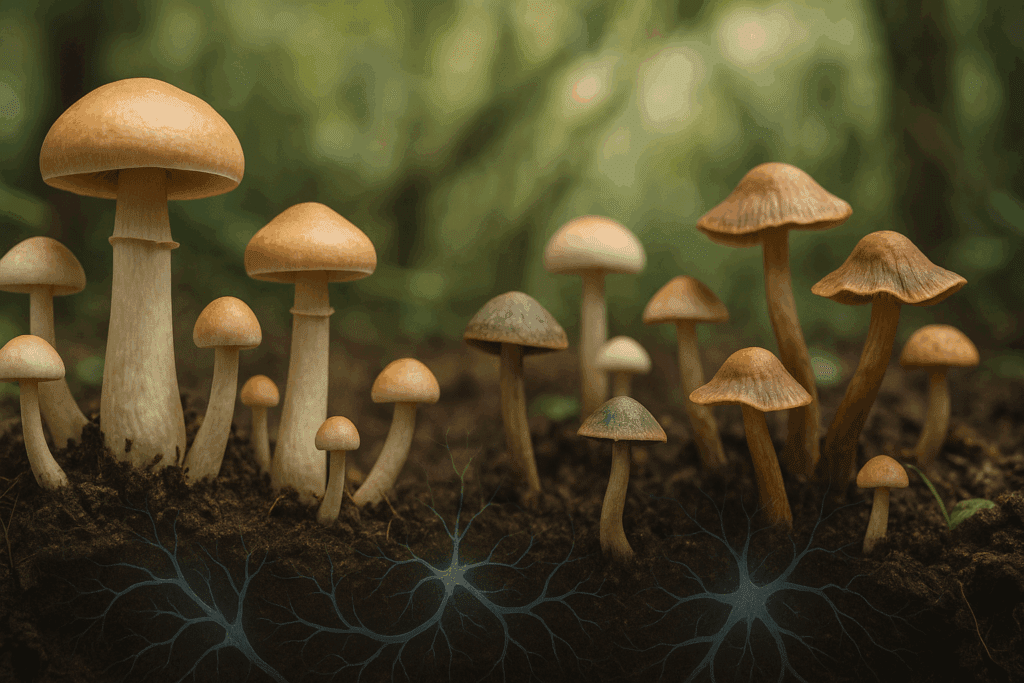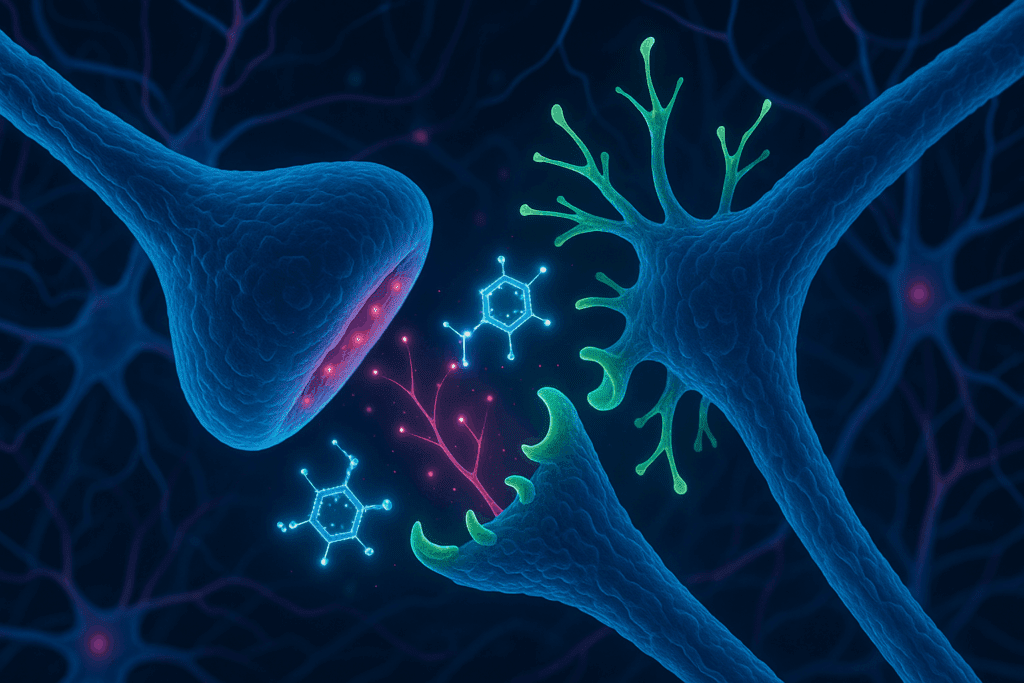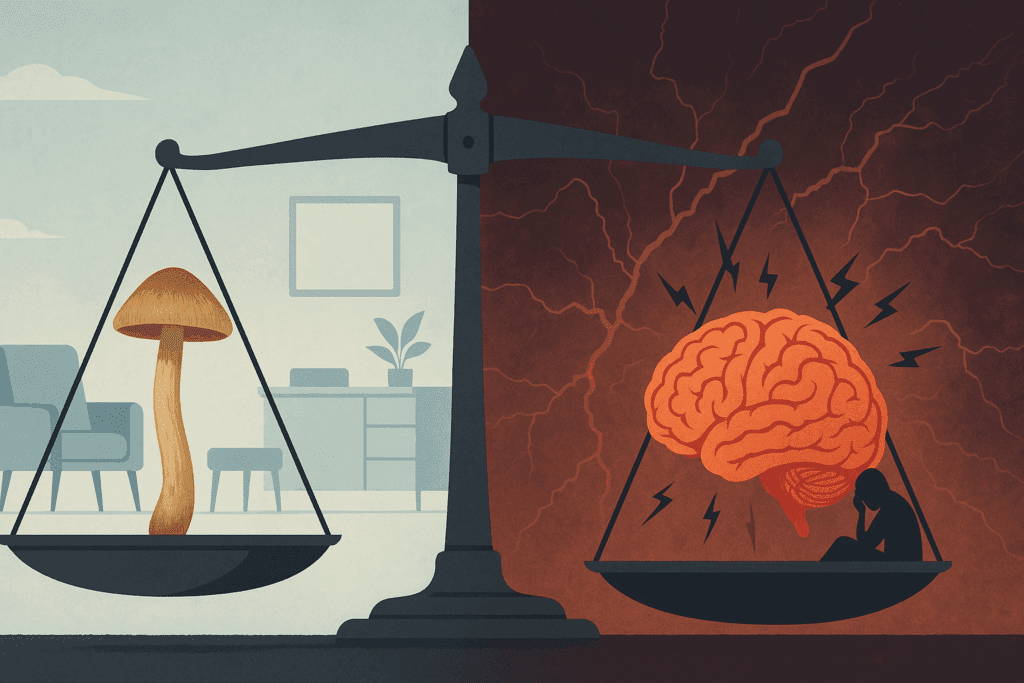Unlocking the Potential of Psilocybin Neurogenesis for Brain Vitality
In the evolving landscape of cognitive health, the concept of psilocybin neurogenesis has emerged as a promising frontier. Psilocybin, the psychoactive compound found in certain species of mushrooms, is no longer seen solely through the lens of its hallucinogenic properties. Increasingly, researchers are investigating its potential role in promoting neurogenesis, the birth of new neurons, a process once thought impossible beyond early development. Neurogenesis mushrooms are captivating scientists and the public alike, sparking hope for innovative strategies to enhance brain health, support emotional resilience, and mitigate neurodegenerative decline.
You may also like: Where to Buy Bacopa Monnieri: How to Find Quality Supplements for Cognitive and Memory Support
This growing fascination parallels rising interest in nutritional neuroscience, much like the fervent discussions around multivitamin efficacy and their implications for cognitive longevity. Just as studies on multivitamin memory study results highlight the capacity of daily supplementation to bolster mental performance, emerging research into psilocybin mushrooms proposes that nature may harbor even more powerful tools for neural rejuvenation. By examining the synergy between traditional wisdom and modern scientific inquiry, we can begin to appreciate how neurogenesis mushrooms might offer profound, natural pathways to maintaining and improving brain health over the lifespan.

Understanding Neurogenesis: From Scientific Theory to Practical Reality
Neurogenesis, once relegated to developmental biology textbooks, has surged to the forefront of adult neuroscience research. The landmark discovery that new neurons could indeed form in the adult hippocampus challenged longstanding dogma and opened new therapeutic possibilities. This revelation sparked inquiries into how lifestyle interventions, such as exercise, mindfulness, and nutrition, might enhance this intrinsic capacity for renewal.
Similarly, interest in cognitive supplementation rose, exemplified by the surge in multivitamin research. A new study on vitamin supplements revealed promising correlations between daily vitamin for memory loss prevention and improved executive function, particularly in aging populations. These findings underscore a broader principle: interventions that nourish the body often simultaneously fortify the mind. Psilocybin neurogenesis represents the next evolution of this principle, suggesting that targeted, natural compounds might directly stimulate neuronal birth and brain plasticity.

The Science Behind Psilocybin Neurogenesis
Scientific studies have begun to uncover how psilocybin affects neurogenesis at a cellular level. Research indicates that psilocybin promotes dendritic growth and increases synaptogenesis—the formation of new synaptic connections—particularly in areas associated with memory, learning, and emotional regulation. This molecular activity is crucial because robust synaptic density is linked to cognitive flexibility, emotional resilience, and overall brain health.
The burgeoning body of evidence around psilocybin neurogenesis parallels observations from the multivitamin dementia study, where micronutrient supplementation contributed to improved neurological outcomes in dementia patients. Both lines of inquiry emphasize the role of external, bioactive compounds in modulating brain plasticity, pointing to exciting new possibilities for preventing cognitive decline. Although psilocybin research is still in its early stages compared to the extensive body of multivitamin news, its trajectory suggests a potentially transformative impact on how we approach brain health naturally.
Neurogenesis Mushrooms: Nature’s Unlikely Allies in Brain Health
The term neurogenesis mushrooms refers primarily to psilocybin-containing species such as Psilocybe cubensis, Psilocybe semilanceata, and Psilocybe cyanescens. While these mushrooms have long been revered in indigenous cultures for their spiritual and ceremonial significance, contemporary science is now revealing their biochemical sophistication. Psilocybin mushrooms appear to interact with the brain’s serotonin system, particularly the 5-HT2A receptor, stimulating neural activity patterns conducive to plasticity and growth.
Comparatively, the burgeoning field of nootropic research often celebrates multivitamin for brain function support as a fundamental strategy for cognitive resilience. Multivitamin and memory loss studies continue to validate the benefits of comprehensive nutritional support. Neurogenesis mushrooms, however, may represent an even more targeted intervention, with the potential to directly rewire and rejuvenate the aging brain.

Historical Use of Psychedelic Mushrooms and Emerging Modern Applications
Long before laboratory investigations, indigenous cultures worldwide recognized the profound cognitive and spiritual effects of psilocybin mushrooms. From the Mazatec shamans of Mexico to ancient Siberian tribes, these “teonanacatl” (“flesh of the gods”) fungi were used to induce visionary states, promote healing, and access deeper realms of consciousness.
Modern therapeutic frameworks are now beginning to incorporate psilocybin neurogenesis as a legitimate medical pathway. Clinical trials are exploring how controlled psilocybin use may benefit individuals suffering from treatment-resistant depression, PTSD, and even early cognitive impairment. These developments echo how multivitamin dementia study results initially faced skepticism before gaining widespread acceptance. In both cases, initial cultural biases are giving way to rigorous scientific validation, transforming once-controversial therapies into credible medical interventions.
Psilocybin and Brain Plasticity: Evidence from Animal and Human Studies
Animal studies have been instrumental in elucidating psilocybin’s effects on neurogenesis. Rodent models exposed to psilocybin demonstrated increased proliferation of progenitor cells in the hippocampus, along with enhanced behavioral markers of learning and emotional adaptability. These outcomes are strikingly similar to benefits observed in multi vitamin study findings, where comprehensive nutritional strategies improved memory retention and problem-solving abilities.
In human studies, functional imaging reveals that psilocybin modulates default mode network activity, often leading to decreased rumination and improved emotional regulation. Early-phase clinical research suggests that psilocybin-induced neuroplasticity could underlie long-lasting therapeutic effects, even after a single administration. This potential for durable change contrasts with the daily commitment required for multivitamins to slow memory loss, highlighting psilocybin’s unique therapeutic profile.

Comparative Insights: Psilocybin Neurogenesis vs. Nutritional Neuroprotection
While both psilocybin and multivitamin supplements aim to protect and enhance brain function, their mechanisms differ fundamentally. Multivitamin efficacy largely revolves around providing essential micronutrients that the body requires for maintenance and repair. These nutrients act as cofactors in critical enzymatic reactions, support antioxidant defenses, and contribute to overall cellular vitality. The multivitamin and memory loss study landscape consistently underscores these incremental, foundational benefits.
In contrast, psilocybin neurogenesis operates more directly on neurochemical pathways, triggering cascades of growth-promoting signals and fostering immediate structural changes within the brain. While multivitamin research encourages a long-game approach to cognitive preservation, neurogenesis mushrooms may offer a dynamic catalyst for brain remodeling, especially when integrated thoughtfully within broader wellness protocols.
Potential Risks and Ethical Considerations Surrounding Neurogenesis Mushrooms
Despite the excitement surrounding psilocybin neurogenesis, it is critical to acknowledge the potential risks. Psychedelic experiences can sometimes provoke anxiety, paranoia, or exacerbate latent psychiatric conditions. Just as responsible multivitamin news coverage emphasizes the importance of evidence-based dosing and individualized assessment, discussions about neurogenesis mushrooms must equally prioritize safety, ethics, and personalized care.
Current best practices advocate for medically supervised use of psilocybin, ideally within structured therapeutic contexts. This model mirrors how healthcare providers now tailor multivitamin for dementia patients based on comprehensive nutritional profiling, ensuring maximum benefit with minimal risk. As neurogenesis mushrooms move from the fringes toward mainstream clinical application, maintaining rigorous ethical standards will be essential to safeguard public trust and optimize outcomes.
The Future of Brain Health: Integrating Psilocybin, Nutrition, and Lifestyle
Envisioning the future of cognitive wellness invites an integrative approach. Combining the benefits of neurogenesis mushrooms with evidence-based nutritional strategies such as a daily vitamin for memory loss could offer synergistic advantages. The emerging consensus from multi vitamin study results and the new study on vitamin supplements emphasizes the value of holistic interventions that address multiple facets of brain aging.
For instance, incorporating lifestyle pillars—including physical activity, mindfulness, social connection, and targeted supplementation—may create an optimal environment for psilocybin-induced neuroplasticity to flourish. Much like how multivitamin dementia study participants showed enhanced outcomes when vitamins were part of broader lifestyle interventions, psilocybin therapies may achieve their greatest efficacy within a comprehensive wellness paradigm.
Practical Applications and Considerations for Interested Individuals
Individuals considering neurogenesis mushrooms as part of their cognitive health strategy must proceed thoughtfully. Legal status varies widely, and psilocybin remains a controlled substance in many jurisdictions. It is crucial to seek information from reputable, science-based sources and to consult healthcare providers familiar with psychedelic-assisted therapies.
Similarly, individuals exploring multivitamin for brain function enhancement are advised to select products backed by clinical evidence and to consider personalized assessments to optimize nutrient intake. Just as the multivitamin memory study illuminated the benefits of tailored supplementation, personalized approaches to psilocybin use—grounded in careful screening, therapeutic intention, and professional support—promise the best outcomes.
Embracing Emerging Frontiers: A New Paradigm for Cognitive Vitality
The exploration of psilocybin neurogenesis represents a broader awakening to the power of natural interventions in shaping brain health. Neurogenesis mushrooms may one day join the ranks of other evidence-based strategies, offering profound, nature-derived solutions for maintaining cognitive vitality across the lifespan. In this journey, the lessons gleaned from multivitamin efficacy studies, multivitamin news updates, and vitamin supplement study findings provide a valuable blueprint: rigorous research, personalized application, and integrative practice are the keys to unlocking sustainable well-being.
As the scientific community continues to unravel the mysteries of psilocybin’s effects on the brain, it is an exciting time to advocate for responsible, research-driven innovation. In doing so, we honor both ancient wisdom and cutting-edge discovery, paving the way for a future where holistic, natural strategies stand at the forefront of brain health.
FAQ: Psilocybin Neurogenesis and Neurogenesis Mushrooms
1. How does psilocybin neurogenesis differ from traditional methods of enhancing brain health?
Psilocybin neurogenesis stands apart from traditional brain health strategies because it actively stimulates the formation of new neurons rather than merely preserving existing ones. While multivitamins and lifestyle interventions like exercise mainly maintain neuronal integrity, neurogenesis mushrooms initiate direct structural changes in the brain. This regenerative quality opens new pathways for therapeutic applications beyond basic cognitive support. In contrast to slow-acting supplements, the neurogenic effects of psilocybin have been observed to occur within a shorter time frame, offering exciting potential for acute cognitive revitalization. Furthermore, psilocybin neurogenesis may influence emotional adaptability and creativity, domains that standard brain health interventions often neglect.
2. Are all psilocybin-containing mushrooms classified as neurogenesis mushrooms?
While many psilocybin-containing mushrooms show potential for stimulating neurogenesis, not all have been formally classified as “neurogenesis mushrooms” in scientific literature. Different species exhibit varied concentrations of psilocybin, psilocin, and related alkaloids, which may impact their efficacy in promoting neuronal growth. Some emerging studies suggest that specific strains may possess a richer profile of neurogenic compounds beyond psilocybin alone. Ongoing research into lesser-known species could eventually expand the category of neurogenesis mushrooms to include a broader array of fungi with cognitive-enhancing potential. Understanding the phytochemical diversity across mushroom species is crucial for optimizing the use of psilocybin neurogenesis protocols.
3. Can microdosing neurogenesis mushrooms enhance everyday cognitive function?
Microdosing—taking sub-perceptual amounts of psilocybin—has garnered attention as a possible method for subtly enhancing everyday cognition without the intense psychedelic experience. Some users report improved focus, creativity, and emotional resilience, suggesting that microdosing might stimulate mild psilocybin neurogenesis over time. Though formal clinical evidence remains limited, anecdotal accounts are fueling scientific interest in the nuanced effects of low-dose exposure to neurogenesis mushrooms. Unlike high-dose psychedelic therapy sessions, microdosing aims to integrate cognitive benefits seamlessly into daily life. Future longitudinal studies will be essential to establish the long-term impact of microdosing on neuroplasticity and overall brain health.
4. What role might diet and lifestyle play in supporting psilocybin neurogenesis?
Maximizing the effects of psilocybin neurogenesis may require a comprehensive approach that includes diet and lifestyle optimization. Nutrient-rich diets abundant in antioxidants, omega-3 fatty acids, and polyphenols can create a cellular environment conducive to neuronal growth. Regular exercise and mindfulness practices such as meditation also enhance brain-derived neurotrophic factor (BDNF), potentially synergizing with the neurogenic impulses from neurogenesis mushrooms. Furthermore, reducing chronic stress is critical, as elevated cortisol levels can counteract the beneficial effects of neurogenesis. Integrating these strategies creates a holistic framework that amplifies the potential benefits of psilocybin on brain regeneration.
5. How might psilocybin neurogenesis influence emotional health beyond cognition?
Beyond its effects on learning and memory, psilocybin neurogenesis may profoundly impact emotional resilience and psychological flexibility. Increased neuronal growth, particularly in the hippocampus and prefrontal cortex, could enhance an individual’s capacity to regulate emotions and recover from psychological trauma. Some researchers believe that neurogenesis mushrooms may help “reset” dysfunctional neural circuits associated with conditions like depression and anxiety. This emotional recalibration complements cognitive gains, positioning psilocybin not just as a brain enhancer but as a full-spectrum mental wellness agent. Future therapeutic models may leverage this dual benefit to create more comprehensive interventions for both emotional and cognitive health.
6. Are there specific biomarkers to measure the effects of neurogenesis mushrooms on the brain?
Identifying biomarkers to assess the impact of psilocybin neurogenesis is an emerging area of interest. Techniques such as magnetic resonance imaging (MRI) and positron emission tomography (PET) can detect structural and functional changes in brain regions associated with neurogenesis. Biomarkers like BDNF levels in blood plasma are also being investigated as indirect measures of neuronal growth stimulated by neurogenesis mushrooms. Additionally, cognitive performance tests assessing memory, attention, and executive function offer practical insights into functional improvements. Continued refinement of these biomarkers will be critical for validating the therapeutic potential of psilocybin neurogenesis in both clinical trials and individualized treatment plans.
7. How does age affect the potential benefits of psilocybin neurogenesis?
Age appears to play a significant role in how individuals respond to neurogenesis mushrooms. Younger brains naturally exhibit higher baseline neurogenesis rates, suggesting that psilocybin might further amplify this innate capacity. In older adults, where neurogenesis declines, psilocybin neurogenesis could offer a powerful means of rejuvenating cognitive functions and mitigating age-related decline. However, age-related changes in neurochemistry and receptor sensitivity may influence dosing and therapeutic outcomes. Personalized protocols that consider an individual’s age, health status, and cognitive goals will be crucial for optimizing the benefits of neurogenesis mushrooms across the lifespan.
8. Could combining psilocybin with other neurogenic compounds enhance outcomes?
Emerging research suggests that stacking psilocybin with other neurogenic compounds—such as lion’s mane mushroom, bacopa monnieri, or even specific nootropics—might create synergistic effects. This practice aims to leverage multiple pathways for promoting psilocybin neurogenesis, enhancing both the speed and durability of cognitive improvements. Neurogenesis mushrooms could act as potent catalysts, while additional supplements provide sustained support for neuron maturation and integration. However, caution is warranted, as interactions between bioactive compounds are complex and not fully understood. Controlled studies are needed to explore optimal combinations that maximize brain regeneration safely and effectively.
9. What are the potential societal implications of widespread psilocybin neurogenesis therapies?
If psilocybin neurogenesis proves to be a reliable tool for cognitive enhancement and emotional healing, its societal implications could be profound. Widespread access to neurogenesis mushrooms might reduce the prevalence of mental health disorders, increase productivity, and foster greater creativity across communities. However, equitable access, regulatory frameworks, and ethical considerations must be addressed to prevent misuse and ensure that benefits are distributed fairly. There is also the potential for reshaping how we approach education, aging, and even workforce development by prioritizing lifelong brain health. These societal transformations hinge on integrating psilocybin therapies responsibly and inclusively.
10. What future research directions are most promising for psilocybin neurogenesis?
The future of psilocybin neurogenesis research holds exciting possibilities, particularly in precision medicine, where interventions are tailored to an individual’s unique genetic and neurochemical profile. Studies exploring how microdosing regimens, macrodosing protocols, and psychedelic-assisted psychotherapy differentially impact brain plasticity are underway. Investigating how environmental factors such as social support or exposure to nature modulate the effects of neurogenesis mushrooms could yield powerful adjunct strategies. Researchers are also keen to map the full molecular pathways activated during psilocybin-induced neurogenesis, offering opportunities for the development of novel, targeted therapeutics. Ultimately, a multidisciplinary approach combining neuroscience, psychology, and holistic wellness practices promises to unlock the full potential of psilocybin for brain health and beyond.

Conclusion: The Promise of Psilocybin Neurogenesis and Natural Brain Health
In synthesizing the current body of research on psilocybin neurogenesis, one truth becomes clear: the human brain possesses remarkable capacities for growth, adaptation, and healing when supported by intentional, evidence-based interventions. Neurogenesis mushrooms offer an intriguing, scientifically plausible pathway to enhance neuroplasticity, much like the multivitamin and memory loss study landscape illustrates the enduring value of nutritional support.
The convergence of discoveries in psilocybin research, multivitamin dementia study findings, and the growing new study on vitamin supplements movement heralds a new era of cognitive empowerment. By embracing natural interventions—whether through neurogenesis mushrooms, a high-quality daily vitamin for memory loss, or broader lifestyle strategies—we can cultivate a brain that is not merely resistant to decline but actively engaged in renewal.
Future studies will undoubtedly refine our understanding, optimizing protocols to maximize safety and efficacy. Yet even now, the promise is profound. Just as multivitamins may slow memory loss, psilocybin and other natural agents may one day be standard components of a comprehensive, personalized approach to lifelong brain health. As we move forward, the integration of tradition, science, and holistic practice offers an inspiring vision of what is possible when we align our natural biology with the best that both nature and research have to offer.
Was this article helpful? Don’t let it stop with you. Share it right now with someone who needs to see it—whether it’s a friend, a colleague, or your whole network. And if staying ahead on this topic matters to you, subscribe to this publication for the most up-to-date information. You’ll get the latest insights delivered straight to you—no searching, no missing out.
Further Reading:
Where to Buy Bacopa Monnieri: How to Find Quality Supplements for Cognitive and Memory Support
Psilocybin desynchronizes the human brain
Psilocybin desynchronizes the human brain
.Important Note: The information contained in this article is for general informational purposes only, and should not be construed as health or medical advice, nor is it intended to diagnose, prevent, treat, or cure any disease or health condition. Before embarking on any diet, fitness regimen, or program of nutritional supplementation, it is advisable to consult your healthcare professional in order to determine its safety and probable efficacy in terms of your individual state of health.
Regarding Nutritional Supplements Or Other Non-Prescription Health Products: If any nutritional supplements or other non-prescription health products are mentioned in the foregoing article, any claims or statements made about them have not been evaluated by the U.S. Food and Drug Administration, and such nutritional supplements or other health products are not intended to diagnose, treat, cure, or prevent any disease.


